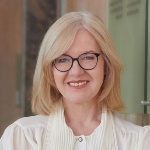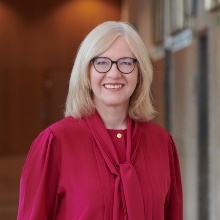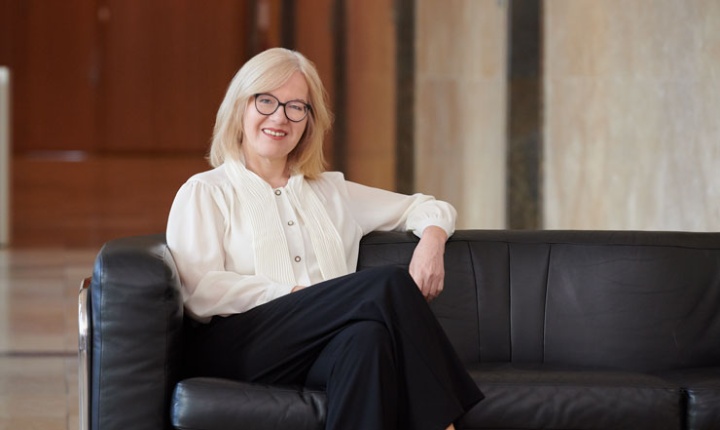You have now been Chancellor at the University of Stuttgart for two months. What are your first experiences and impressions?
My colleagues in Central Administration were incredibly supportive during my onboarding here. They are extremely loyal and supportive, and very committed to the University of Stuttgart. And they have a high level of expertise, which makes it a pleasure to work with them. Honestly, joining a team of colleagues like that is as good as it gets. This must not be taken for granted, and I truly value it.
One of my first experiences was learning new words. Some terms here are completely different from those used in Austria. For example, it took me a long time to find out what the word "abgeordnet" means. In Austria, the word "Abgeordnete" means members of parliament in the National Council or in provincial parliaments. In Germany, it also means to deputize or allocate duties. This gives meaning to the sentence "What separates us is a common language". (laughs)
What made you decide to leave your hometown of Vienna and accept the position of Chancellor at our university in Swabia?
After twelve years at TU Vienna, I was ready for a change. And I always wanted to work abroad. For family reasons, this is the first opportunity that has presented itself during my career so far. Out of the blue, I received a call came from the Chancellor Search Committee. To be honest, I couldn't gauge my chances at all, but I thought to myself: If they're reaching out to me from the University of Stuttgart, which has a very good reputation, then I'll apply.
I then took a closer look at the University of Stuttgart. What I find truly exceptional and unique is the Stuttgart Way, the fusion of a technical university with a focus on humanities and social sciences. I am totally convinced that the future development of our planet and humanity doesn't solely depend on individual disciplines but necessitates a collaborative and interdisciplinary effort. Simply through the courses offered here it is possible to create a network. It quickly became clear to me: I was interested in this university, in this job.
I already knew a bit about Stuttgart through family connections. And I'm now at an age and in a situation where I can work abroad. Of course, leaving Vienna is not easy for anyone. Vienna is a truly wonderful city to live in, as numerous annual rankings affirm. I am, I would say, very Viennese. (laughs) My husband, my children and my cat are still in Vienna. It takes me approximately three and a half hours to travel from door to door, allowing me to spend weekends in Vienna. That was another factor in choosing Stuttgart.
Moreover, I have always been adventurous. And is there anything more exciting than starting a new job? That triggers a sense of euphoria in me, a particular excitement to explore new things. Challenges such as learning new words are easy to overcome.
Is the euphoria still present?
Yes! The job is incredibly exciting, nothing bores me. It's challenging because the responsibilities of a chancellor are very extensive. The first few weeks here were characterized by: "We haven't decided that yet. We were waiting for you." There's a lot to do, but that doesn't worry me. I like it.
Of course, I have now had my first experiences with German bureaucracy, which is certainly annoying from time to time. But now, as Chancellor, I am part of it myself. (laughs) I see potential for improvement, even at the university, and my ambition is to implement everything possible to reduce bureaucracy.
What would you like to focus on as Chancellor?
My perception is that there is a desire for clarity and orientation in the administration. I believe it is important in my first year as Chancellor to create a calm working environment in which individual responsibilities are clearly defined and everyone can work to the best of their ability.
Many projects have been initiated in recent years and that is a lot of balls to juggle. The initial challenge is to bring down these juggling balls from a high altitude, to yield something tangible, to make it concrete. One example from the field of digitalization is document management. We already have everything we need for this. But we don't use it.
Good communication is also very important. To the MWK, and internally. The tasks and achievements of Central Administration must be made more visible. And it is very important to ensure excellent cooperation with all bodies such as the Staff Council, Senate, and University Council. I want to create a framework in which all employees can show a high level of commitment to the university. Only then can we perform to our best potential.
The university offers a diverse, exciting working environment where you can make a difference - we need to make this clear both internally and externally. People no longer stay in one organization their whole lives. But we must make sure that we keep our employees here with us for as long as possible.
What management philosophy will you use to achieve this?
I strongly advocate for taking personal responsibility – not only for managers. This in turn requires a high level of loyalty. What I want to convey to my colleagues is that there are responsibilities and there are competencies. And as Chancellor, I bear significant responsibility. I stand in front of, behind and beside all my employees. This means they can fully rely on me, as I won't shift blame or say, 'You did that wrong,' but instead acknowledge that it is my responsibility.
But loyalty is not a one-way street. Of course, I expect in return the same loyalty that everyone can expect from me. I place a lot of trust in people. I don't believe in control. I assume that they all want to do their best for the University of Stuttgart and believe that this requires good cooperation.
And how do you view the connection between administration and science?
Expert organizations - and that's what we are as a university - tend to draw a line between administration and science. That's what I've experienced at the universities I've worked at. And I believe it is extremely important to bridge this gap because we are all working towards a common goal. Central Administration is not here for its own sake. And I never want to give that impression. It is there to make working, researching, teaching, and learning at the university as effective as possible. I see a connection there, where we support and complement each other, and that we can also lead the Stuttgart Way in this direction. We have experts in science and experts in administration who can come together as equals.
Finally, back to the differences between Germany and Austria: Do you still miss Vienna? And do you like Stuttgart?
Of course, I miss Vienna a bit, but I've already met a few other Austrians at the university and in Stuttgart. And Stuttgart hasn't given me any reason to feel lonely. I don't have the time. I live centrally and walk everywhere. It's all uphill and downhill - just like the streets of San Francisco. I have to walk uphill to get home in the evening, which is very good for my fitness.
I like Stuttgart a lot. The city center is a manageable size with some nice places, for example the market hall with its small specialty stores. And I have already tried the Stuttgart wine, Trollinger. I don't think it's that bad. The people in Stuttgart moan about it the most! (laughs)
Yes, and perhaps one more thing, even if it sounds a bit decadent and some people are sure to shake their heads and wonder if there aren't better things to do. (laughs) What I really miss from Vienna is a certain culture of celebration. Balls or academic celebrations always involved gowns, a certain amount of pomp and ceremony. I haven't observed that here; German universities are much more reserved. That's a bit of a shame. I think it would be great to organize a Uni-Stuttgart ball. Apparently, there was one once. That would certainly strengthen the sense of community, which I view as one of my tasks as Chancellor. On the other hand, as head of university finances, I am aware that this is a sensitive issue. (laughs)
For now, I'm happy that I've found a great team and that we can hit the ground running in February, well-equipped to face the challenges ahead.
Then have fun and thank you very much for the interview.
About the new Chancellor
Anna Steiger, born in 1965, completed her studies in law, journalism, and political science at the University of Vienna in 1993 with a Magister degree. After working at a law firm, a management consultancy company and the legal department of the Academy of Fine Arts Vienna, she was employed as head of human resources and labor market policy at the Lower Austrian Volkshilfe. From 2003 to 2011, as Vice Rector for Personnel, Resources, and the Advancement of Women, she headed the administration department at the Academy of Fine Arts Vienna and was responsible for the personnel and financial budget. From 2011 to 2023, she was Vice Rector for Human Resources and Gender at the Vienna University of Technology, where her responsibilities included human resource management, the personnel budget, the digitization of administration, and diversity management. She has been Chancellor of the University of Stuttgart since November 22, 2023.

Anna Steiger
Chancellor at the University of Stuttgart

Lydia Lehmann
Deputy Head of University Communications



